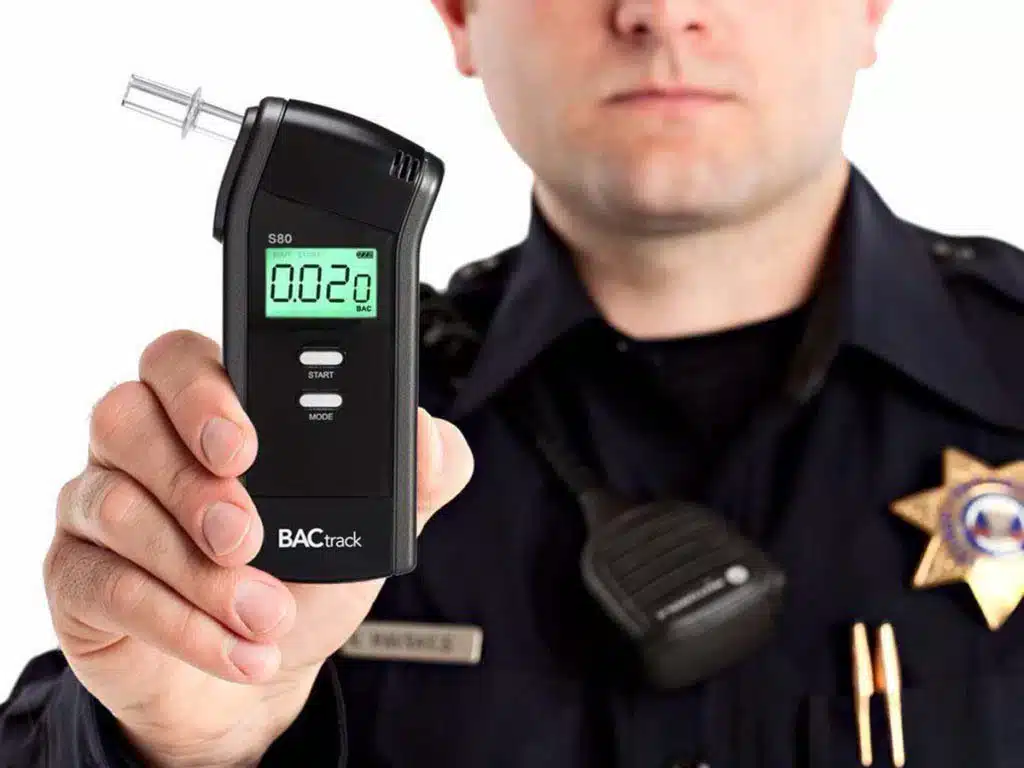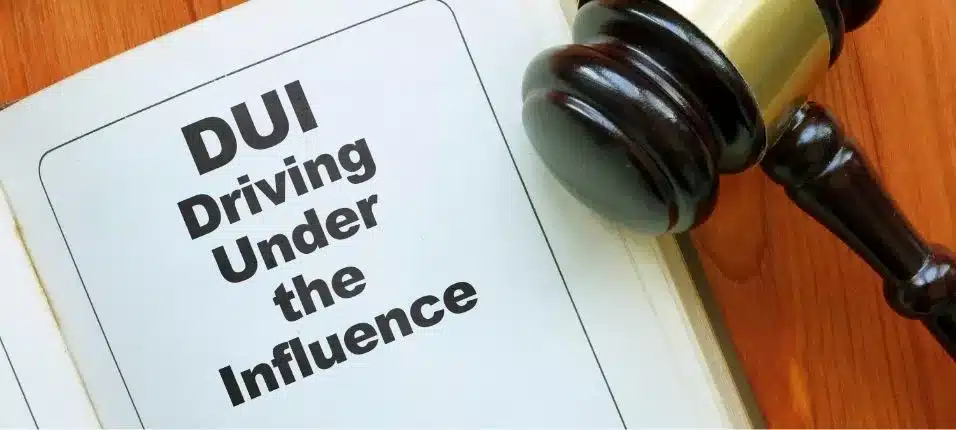
2. Implied Consent DUI Law
Under Georgia’s Implied Consent Law, any person operating a vehicle consents to chemical testing if suspected of DUI. Refusal can result in:
- A 1-year license suspension for first-time refusal, under “hard suspension” terms, meaning no exceptions for work or school.
- Court Use of Refusal as Evidence: Refusing the test can be interpreted as an indication of guilt in court.
Procedure: Before testing, officers must read an implied consent notice, clearly explaining the penalties for refusal.
Sources: Georgia Code Title 40-5-67.1
3. Penalties for DUI Law Offenses for Adults (21 and Older)
First Offense:
- Jail: 10 days to 12 months (usually suspended, but may include a mandatory period).
- Fines: $300 to $1,000 plus court fees.
- Community Service: Minimum 40 hours.
- License Suspension: Generally 1 year, with possible reinstatement after 120 days.
- DUI Risk Reduction Program: Required course (approx. $300).
Second Offense (Within 10 Years):
- Jail: 90 days to 12 months.
- Fines: $600 to $1,000.
- Community Service: Minimum 240 hours.
- License Suspension: Up to 3 years.
- IID Requirement: Ignition Interlock Device required for reinstatement.
Third Offense:
- Jail: 120 days to 12 months.
- Fines: $1,000 to $5,000.
- Community Service: 240 hours.
- Habitual Violator Status: License revocation and the potential for vehicle forfeiture.
Sources: Georgia Code Title 40-6-391(c)
4. Aggravated DUI Law and Additional Factors
In cases of aggravated DUI:
- High BAC: A BAC of 0.15% or higher can lead to harsher penalties.
- Child Endangerment: DUI with a minor passenger adds separate endangerment charges per child.
- Injury or Fatality: Incidents causing serious injury or death result in felony charges and extensive prison sentences.
Sources: Georgia Code Title 40-6-391.1, 40-6-394, 40-6-393
5. Open Container DUI Law
Georgia’s Open Container Law prohibits open alcohol containers in the vehicle’s passenger area on public highways, with exceptions in limousines and ride-shares under specific conditions. Violating this law results in a misdemeanor and fines up to $200. The image below shows the existence of open container laws based on the state within the US.
Sources: Georgia Code Title 40-6-253
6. Reckless Driving vs. DUI Laws
DUI charges may sometimes be reduced to reckless driving, which carries a $1,000 fine and up to 12 months in jail but lacks the stigma and longer-term penalties of a DUI.
Sources: Georgia Code Title 40-6-390
7. DUI Law for Drugs (Prescription and Illegal)
Georgia’s DUI laws apply to all impairing substances, including drugs like marijuana or prescription medication. A “per se” marijuana law allows for DUI charges if any active marijuana metabolite is detected.
Sources: Georgia Code Title 40-6-391(a)(2)
8. Habitual Violator Status
Classification: Three or more DUIs in five years results in Habitual Violator status, triggering a 5-year license revocation with potential for felony charges on future DUI offenses.
Sources: Georgia Code Title 40-5-58
9. Underage DUI Law (Under 21) Penalties
For drivers under 21:
- First Offense: Up to 12 months in jail, $300 fine, and 20 hours community service.
- License Suspension: 6 months if BAC is 0.02% – 0.08%; 1 year for BAC above 0.08%.
- DUI Risk Reduction Program: Mandatory for reinstatement.
Sources: Georgia Code Title 40-6-391(k)
10. License Reinstatement and Fees
- DUI Risk Reduction Program: Required for reinstatement.
- IID Program for Second and Subsequent Offenses: Mandatory for eligible drivers, with fees for installation and monthly maintenance.
Sources: Georgia Code Title 40-5-64
These comprehensive Georgia DUI laws emphasize road safety and offer escalating penalties for repeat offenders, reflecting the state’s commitment to reducing impaired driving. For individuals impacted by DUI incidents, consulting an experienced DUI accident lawyer may be essential in understanding rights and navigating potential compensation.
When Do I Need an Attorney?
In the event of a DUI charge, having an DUI lawyer can be invaluable for navigating the legal process, minimizing penalties, and defending your rights. Here’s when you should definitely consider hiring one:
DUI Charge:
A DUI charge in Georgia is serious and can carry steep fines, potential jail time, mandatory community service, and license suspension. Attorneys specializing in DUI law know how to assess the evidence, such as BAC test results or field sobriety test validity, and may even negotiate a reduction in charges or penalties. If this is a second or subsequent offense, the stakes are even higher, making legal representation essential.
DUI Accident:
If you’re involved in a DUI-caused accident, having an attorney is crucial. DUI accidents can lead to lawsuits from other drivers or passengers, and insurance companies often limit compensation in DUI-related cases. To maximize compensation for injuries, vehicle damage, and minimize out-of-pocket losses, an attorney can negotiate with insurance companies, handle court proceedings, and protect you against liability claims.
Refusal to Submit to Testing:
Refusing a breathalyzer or other BAC test in Georgia can result in an automatic license suspension due to the state’s implied consent laws. An attorney can help you appeal the suspension or work on obtaining a limited driving permit, allowing you some driving privileges during your suspension period.
Underage DUI Charge:
If an individual under 21 faces a DUI charge, they are subject to different, often stricter penalties. An attorney can help in exploring options for sentence reduction, license reinstatement, or community service arrangements that meet the court’s requirements while minimizing the long-term impact on the individual’s record.
Aggravating Factors in Your Case:
If your DUI law case involves aggravating factors like a very high BAC, an accident with injuries, or child endangerment, the penalties are likely to be more severe. An experienced attorney can guide you through this complex legal terrain, challenge evidence where appropriate, and present mitigating factors to the court.
In any of these scenarios, contacting an attorney as soon as possible can make a major difference in how your case proceeds and its ultimate outcome. Legal guidance in DUI law cases helps ensure you have the best possible defense, minimize penalties, and manage the financial and personal implications of a DUI charge.
Accident?
Our team of experienced DUI lawyers is ready to help you assess your case and fight for the compensation you deserve. Don’t let the negligence of others dictate your future—let us be your advocate in this challenging time.

Additional Info on DUI Law Sources:
1. Essential BAC Limits and DUI Definitions
-
Georgia Code Title 40-6-391(a) sets critical BAC limits for different age groups and commercial drivers. The ultimate limit for adults is 0.08%, while drivers under 21 face a zero-tolerance threshold of 0.02%. Commercial drivers have a stricter BAC cap of 0.04%.
-
DUI Less Safe Law: This law empowers officers to charge drivers based on observed impairment alone—an essential provision for enhancing road safety.
2. Georgia’s Ultimate Implied Consent Law
-
Implied Consent: Under Title 40-5-67.1, drivers implicitly agree to BAC testing just by being on Georgia’s roads. This law’s absolute impact means that refusal can bring swift, unforgiving license suspension for up to a full year.
-
License Suspension for Refusal: Refusing a BAC test under this essential law results in an automatic suspension and a hard stop to all driving privileges.
3. Ultimate Penalties for DUI Offenses (21+)
-
First Offense: Georgia’s first-offense DUI penalties are designed as a powerful deterrent. Jail time, fines, mandatory DUI education, and license suspension are standard responses to ensure offenders recognize the seriousness of impaired driving.
-
Second Offense: The intensity rises for second offenses, with higher fines, longer jail time, and an unforgiving requirement to install an Ignition Interlock Device (IID) before getting back on the road.
-
Third Offense: Penalties for a third DUI offense are severe and unrelenting, often including publicized conviction notices and Habitual Violator classification—a decisive stance from Georgia against repeat offenders.
4. Aggravated DUI and Special Circumstances
-
Aggravating Factors: This vital category enhances penalties for high BACs, child endangerment, or resulting injuries. DUI with aggravated factors triggers maximum penalties, reflecting the ultimate commitment to public safety.
-
Vehicular Injury or Homicide: Fatalities or serious injuries turn a DUI offense into a life-altering felony, where penalties carry exceptional weight, including long-term imprisonment.
5. Open Container Law: Zero Tolerance for Distraction
- The Open Container Law under Title 40-6-253 emphasizes Georgia’s unwavering stance on sober driving. Violations, even for passengers, bring strict penalties to discourage any chance of distraction or impairment on the road.
6. Reckless Driving as an Alternative Charge
- Reckless Driving: Although less severe than a DUI, Georgia’s reckless driving laws still wield powerful consequences—highlighting that reckless or careless driving carries its own significant penalties.
7. DUI for Drugs: Covering All Impairment Forms
-
Drug-Related DUI: Georgia’s commitment to safety includes robust enforcement of DUI laws for drivers impaired by any substance, whether over-the-counter, prescription, or illegal drugs—a crucial measure ensuring all forms of impairment are addressed.
-
Per Se Marijuana Law: This strict “per se” rule emphasizes that any detectable amount of marijuana metabolite means a DUI charge, underscoring Georgia’s absolute intolerance for impaired driving.
8. Habitual Violator Status: Maximum Penalties for Repeat Offenders
-
Ultimate Deterrent: For drivers who repeatedly violate DUI laws, Georgia’s Habitual Violator classification represents an uncompromising stance. License revocation and felony charges for future offenses are among the most severe responses possible.
-
Felony Charges: Subsequent DUI charges for Habitual Violators bring undeniably harsh penalties, emphasizing accountability for chronic offenses.
9. Underage DUI: No Tolerance for Minors
- Zero-Tolerance Policy: With a BAC limit of 0.02% for those under 21, Georgia enforces a strict, no-exception approach to underage DUI. This zero-tolerance stance sends a clear message about the dangers and consequences of impaired driving.
10. Ultimate Path to License Reinstatement
-
DUI Risk Reduction Program: Completion of this program is an essential prerequisite for offenders seeking reinstatement—a step reinforcing Georgia’s dedication to reducing DUI risk.
-
IID Program Requirements: For second-time and subsequent offenders, IID installation is a non-negotiable requirement for reinstatement, driving home Georgia’s unyielding stance on preventing repeat offenses.




